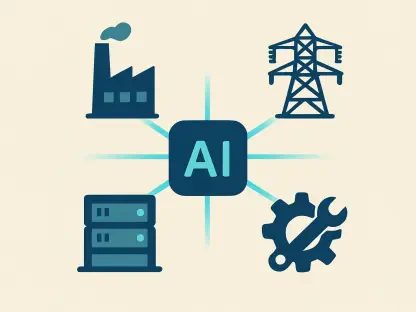In the rapidly evolving world of artificial intelligence, staying ahead of the competition requires not only innovation but also the ability to produce tangible improvements in performance and efficiency. Deep Cogito Inc., a startup established in June by former Google engineers Drishan Arora and Dhruv Malhotra, has launched a series of open-source language models under the moniker Cogito v1. These models, spread across five sizes ranging from 3 billion to 70 billion parameters, showcase the potential to redefine benchmarks in the industry. These models, based on Meta Platforms Inc.’s Llama and Alibaba Group Holding Ltd.’s Qwen language model families, promise enhanced performance through their unique hybrid architecture.
The Hybrid Architecture Revolution
Combining Speed and Quality
The hybrid architecture of Deep Cogito’s models represents a significant departure from traditional large language models (LLMs). Traditionally, large language models are designed to produce quick responses to relatively simple queries but often struggle with more complex reasoning tasks. Deep Cogito’s innovative approach merges these quick-response capabilities with reasoning models, which spend additional time generating higher quality answers. This dual capability allows the Cogito v1 models to either provide instant responses or engage in deeper, more thoughtful reasoning as per the user’s needs. This flexibility is a key differentiator, marking a step forward in making AI more adaptive and user-friendly in various contexts.
Innovative Training Method: IDA
One of the hallmark features of Deep Cogito’s advancement is its unique training method, called Iterative Distillation and Amplification (IDA). This technique might parallel traditional distillation in its initial stages, but it introduces a transformative aspect. Conventional distillation trains a more hardware-efficient model using answers from a more complex LLM. However, IDA stands apart because it improves the original language model by leveraging its own outputs. The process involves two critical steps: an LLM first generates an answer using intricate reasoning techniques and then distills this enhanced understanding back into the model’s parameters. Repeating these steps establishes a self-improving feedback loop, greatly enhancing the model’s overall proficiency.
Exceptional Performance Metrics
Outshining Competitors in Benchmarks
Internal tests conducted by Deep Cogito illustrate that their most advanced model significantly outperformed Meta’s Llama 3.3 across seven key benchmarks. This demonstrates not only superior capability but also places Deep Cogito at the forefront of AI excellence. Furthermore, the company asserts that even their smaller models, with parameters ranging from 3 billion to 32 billion, achieve better results compared to other available open-source counterparts. This encompassing superiority across different model sizes suggests a robust scalability of the technologies employed, making these models highly versatile for diverse applications.
Preparing for the Next Big Leap
In an audacious and promising move, Deep Cogito plans to introduce even larger models with parameters stretching from 109 billion to a staggering 671 billion in the coming weeks. This development emphasizes the company’s commitment to pushing the boundaries of what’s achievable in language model capabilities. These substantial advancements underscore a vision geared towards continuous improvement and setting new performance standards, which may profoundly impact how AI technology evolves in the near future and its applications across various industries.
Implications and Future Directions
Strengthening AI Efficiency and Power
The strategic innovations introduced by Deep Cogito with their hybrid architecture and IDA training method mark a significant turning point in AI. By blending the capacity for quick responses with deeper reasoning capabilities, the Cogito v1 models offer an improved user experience and pave the way for AI applications to become more adaptive and insightful. Moreover, the iterative improvement technique showcased through IDA represents a move towards self-enhancing AI systems. This approach could set new benchmarks for efficiency and performance, inspiring further research and development in the field.
Potential Industry Impacts and Prospects
The implications of Deep Cogito’s advancements extend beyond immediate performance gains. These developments may drive substantial shifts in how language models are utilized across various sectors, from enhanced customer service bots to more sophisticated data analysis and decision-making systems. Additionally, the scalability of Cogito v1 models means they can be adapted to fit a wide range of use cases, potentially disrupting traditional workflows and enabling new modes of operation. As larger models are rolled out, the industry could witness a transformation in standard AI capabilities, fostering innovations that leverage the augmented power and efficiency of these new tools.
The Future of Hybrid AI Models
Setting New Standards in AI Development
Deep Cogito’s approach ushers in an era where better performance is reachable through methodological advancements rather than solely relying on increased computational power. This paradigm shift towards hybrid architecture, coupled with iterative self-improvement via IDA, outlines a progressive blueprint for future developments in AI. These techniques may inspire other companies and researchers to explore similar avenues, accelerating the overall pace of innovation in the industry. As AI continues to integrate more seamlessly into everyday applications, these high-performing models could redefine expectations and set new standards in how smart systems operate.
Preparing for Future Challenges
In the swiftly advancing realm of artificial intelligence, maintaining a competitive edge necessitates not only innovation but also demonstrable improvements in performance and efficiency. Deep Cogito Inc., a startup founded in June by ex-Google engineers Drishan Arora and Dhruv Malhotra, has introduced a suite of open-source language models named Cogito v1. These models come in five sizes, spanning from 3 billion to 70 billion parameters, and hold the promise to set new industry standards.
Cogito v1 models draw from the expertise of Meta Platforms Inc.’s Llama and Alibaba Group Holding Ltd.’s Qwen language model families, integrating their best elements to offer superior performance. This innovative blend showcases the potential to push the boundaries of what language models can achieve, making significant strides in both accuracy and efficiency.
By building on these robust frameworks from Meta and Alibaba, Deep Cogito Inc. aims to revolutionize the AI landscape, setting new benchmarks and striving for unparalleled advancements in the field of language processing.









